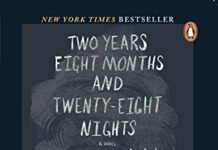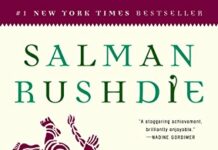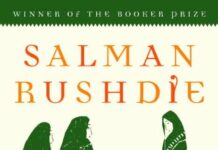
Ebook Info
- Published: 2010
- Number of pages: 674 pages
- Format: EPUB
- File Size: 0.60 MB
- Authors: Salman Rushdie
Description
The iconic masterpiece of India that introduced the world to “a glittering novelist—one with startling imaginative and intellectual resources, a master of perpetual storytelling” (The New Yorker)WINNER OF THE BEST OF THE BOOKERS • SOON TO BE A NETFLIX ORIGINAL SERIES Selected by the Modern Library as one of the 100 best novels of all time • The fortieth anniversary edition, featuring a new introduction by the author Saleem Sinai is born at the stroke of midnight on August 15, 1947, the very moment of India’s independence. Greeted by fireworks displays, cheering crowds, and Prime Minister Nehru himself, Saleem grows up to learn the ominous consequences of this coincidence. His every act is mirrored and magnified in events that sway the course of national affairs; his health and well-being are inextricably bound to those of his nation; his life is inseparable, at times indistinguishable, from the history of his country. Perhaps most remarkable are the telepathic powers linking him with India’s 1,000 other “midnight’s children,” all born in that initial hour and endowed with magical gifts. This novel is at once a fascinating family saga and an astonishing evocation of a vast land and its people–a brilliant incarnation of the universal human comedy. Forty years after its publication, Midnight’s Children stands apart as both an epochal work of fiction and a brilliant performance by one of the great literary voices of our time.
User’s Reviews
Reviews from Amazon users which were colected at the time this book was published on the website:
⭐In a novel that attempts to swallow the whole of post-colonial India, Rushdie’s protagonist doesn’t just encounter her culture, politics, religions, myths, and wars: he lives them. Saleem Sinai sniffs out his predestined path, enhanced by his magical birthright, and divulges the spectral smells of the subcontinent. But not even he, the Blessed One—the Mubarak—can contain in his single life the multifarious identity of India’s six hundred million. Attempting it, he hazards tragedy and eventually—disintegration.”To understand just one life, you have to swallow the world.”Rushdie’s lengthy epic seems to convey a vivid sense of India’s history through the fictitious autobiography of his self-similar protagonist. However, for those of us unfamiliar with the events portrayed, Saleem’s tour of history loses some of its magic—for the same reasons that the film “Forrest Gump” will languish over the decades. Nonetheless, the clever and self-reflective narrator carries us through the pages, which drip with the mysteries of memory and identity.”memory has its own special kind [of truth]. It selects, eliminates, alters, exaggerates, minimizes, glorifies, and vilifies also; but in the end it creates its own reality, its heterogeneous but usually coherent version of events; and no sane human being ever trusts someone else’s version more than his own.”Rushdie does not shy away from the truth of his character’s perspectives. His bravery won him a Booker prize for this novel (but it also led to an attempt on his life for another book—”The Satanic Verses”). Expect no censorship here. This is, indeed, Saleem Sinai’s true story. It might be lacking in compassion and climax, but it compensates with scope and profound insight:”I am the sum total of everything that went before me, of all I have been seen done, of everything done-to-me. I am everyone everything whose being-in-the-world affected was affected by mine. I am anything that happens after I’ve gone which would not have happened if I had not come. Nor am I particularly exceptional in the matter; each ‘I’, every one of the now-six-hundred-million-plus of us, contains a similar multitude. I repeat for the last time: to understand me, you’ll have to swallow a world.”
⭐First read book in college when it first came out. Enjoyed it more with second reading. Rushdie is a master of character development. I loved the nicknames like brass monkey for his sister and reverend mother for his grandmother. Made them even more real. Would highly recommend.
⭐Although Midnight’s Children is proclaimed as Rushdie’s masterpiece, I did not enjoy it as much as I did Shalimar the Clown. It’s epic in its scale and ambition. There is so much here it may be difficult for some readers (myself included) to digest it all. There are a staggering number of minor characters, all realized with Rushdie’s customary skill. There are many passages of brilliance, wit, and wisdom. But these multitudinous characters slither in and out of the narrative making it difficult at times to follow, particularly considering that a novel of this length and complexity does not lend itself to a reading of one, or even just a few sittings. It is in the form of a three-volume “confession” by the narrator, Saleem Sinai, who is born at the exact midnight moment of India’s birth as a nation (hence the novel’s title), to his consort and fiancé, Padma. To add to the difficulties many of the characters have multiple names.Rushdie employs some literary devices that detracted from my enjoyment of the novel. At times it almost seemed as if he was indulging in technique for technique’s sake. One device is repetition. For instance, there’s constant thematic repetition of “knees and nose, nose and knees”, Saleem being the nose and his arch-enemy and rival, Shiva, being the knees. After a while my response was I get it, their fates are intertwined, but I don’t get why I need to read this formula yet again (maybe I don’t get it? I’m not even quite sure why the formula couldn’t be reversed. Are knees aggressive and the nose sensuous? A lot of hammering on one nail.) Another is Rushdie’s use of obscure vocabulary without any clear purpose that I can understand (even when I understand the words without looking them up). For example the words apocrine and eccrine keep popping up in the narrative without any clear reference (at least to me).Another problem I had, particularly with Volume 3 (spoiler alert – don’t read further if you want to remain in suspense), is where we learn of the identity of “the Widow”, who is the villain of the piece. It’s Indira Gandhi. The anti-Gandhi theme introduced here seems a bit overheated. Although Indira Gandhi did do some bad things, particularly the suspension of democracy during the “Emergency” of 1975-77, which is the background for a significant part of Volume 3, they seem pretty small beer when compared with the great historical crimes of the twentieth century. In fact she seems not obviously better or worse than many of the Prime Ministers India has experienced before and afterwards. So the tone of outrage and focus on her as the villainous “Widow”, while it may have been understandable from Rushdie’s perspective at the time Midnight’s Children was completed (1979), seems rather dated.All that said it would be unfair not to note that there are many passages in Midnight’s Children of great beauty and wisdom. Rushdie is unparalleled in capturing the sweep of life in India and Pakistan (and Bangladesh) and his genius for this is at its most expressive in this novel. He is also a writer of great learning and knowledge of what he writes — knowledge which is fully on display here (in a good sense). The Bombay of which he writes is the Bombay of his own childhood; he himself was born in 1947, the year of India’s independence, the same as Saleem, the “hero” of the piece. Along the way, he gives us all sectors of Indian society, from the wealthy and privileged to the underclasses, and he does it with a true novelist’s eye (and nose!) for the telling detail and without editorializing. He succeeds in interweaving the private incidents in the lives of the characters he has created with historical events of the period: from the early part of the twentieth century to the late 70s, when the book was completed. It’s just a shame that because of their sheer number we don’t get to know some of them better. But maybe that’s inherent in Rushdie’s method; he himself has acknowledged his debt to Charles Dickens, and I guess one should no more expect to probe the depths of Nussie the Duck’s or Parvati-the-Witch’s psyches any more than those of Mr. Micawber or “Barkis is willing”.
⭐I read Midnight’s Children as it’s one of those books on all those lists of books one should read. I grew up with this book featuring in the news and in the papers and I think I must have built up some kind of legend around it, thought of it as too weighty, too hard, too important to be a reading experience I could immerse myself in. I’m glad I gave it a go. Yes, it still feels important but it’s a good read. It’s a clever mix of history, magical realism and family saga. It’s true escapism at times and horrifying reality at others.Despite the multitudinous characters and the incredible vocabulary, I followed the narrative, the themes, the imagery and it didn’t feel like hard work. I liked the element of an unreliable narrator and the references to storytelling, whose truth is passed on, what we choose to reveal, what we embellish, what we forget or misremember. Padma’s role was key to grounding things and sometimes speaking my own thoughts out loud.It’s epic and has taken me an absolute age to read, maybe because it’s so dense. Maybe because I’m an idiot. Feeling stupid can be humbling though and there’s value to be found in wading slowly through a well thought out novel rather than zooming through a trashy novel. Was it necessary to use a little used fancy word in place of something that would be more accessible and easy to read? It’s a writer’s book not a marketing brochure or piece of journalism so yes, there is absolutely a place on my bookshelves for work that challenges me, opens my mind, introduces new vocabulary.I often write notes on books as I read them but with Midnight’s Children I just soaked it all up. Knowing it’s often a set text made me wary of over analysing as I read it. Studying English Literature in university momentarily killed my devouring of fiction. Over analysing killed the enjoyment of it and the looming essays tainted my reading time. Not so now.Reading the one star reviews on here I’d say that clearly it’s not for everyone, if you’re looking for a page turning historical romp, this is not it. It’s a different genre. It put me in mind of the Gabriel Garcia Marquez literary vibe.
⭐Not for me. I have persevered until 35% through. Is all the waffle an Indian thing at the time it is set? I have no idea, I cannot follow the waffle and have no interest in the waffle. If that is an Indian thing, that is fine – no problem – just put a warning on the tin. I am sure that if I had the patience to read through and ignore the vast pages of waffle, it might actually be a good story, but as it is, I am losing the will to live and so will henceforth forever be oblivious to the outcome of Saleem whoever and the Midnight Children. I will not even be curious. It will be gone and forgotten except to remind me never to bother reading Salmon Rushdie again. Sorry, but there it is.Salmon Rushdie is not in bad company here. I have no patience for Jane Austin, any of the Bronte’s, William Shakespeare and most of all Sir Walter Scott – they all wrote in older centuries and not in a familiar style, so there could be a bit of a pattern here. Not my accustomed language, not to my taste.I gave it a fair trial, it just didn’t tickle my imagination.Sorry
⭐This winner of the “Booker of Bookers” is a difficult book to read, and a far more difficult one to rate. It frustrated me to no end with the meandering narrative that required me to re-re-read several paragraphs quite frequently and an unusual literary style that challenged my comprehension. The only motivation for me to persevere with it was the magic Mr. Rushdie has made with the words; almost every sentence from this book is eminently quotable!It certainly demands another reading, which I hope to give it, in the not-far-away future.
⭐Ok, it is not an easy read but then again its not a hard read, it just happens to be a brilliant work of fiction that requires some perseverance, mainly to accept the magical realism that twines around the historical and personal stories. Rushdie is certainly a Marmite author, in this work his storytelling gifts are outstanding and his language at times elaborate and meandering, but for me thats the challenge and beauty of his style. The display of imagination in structuring the tale is breathtaking and whilst the pace slows at times, it hangs together to keep the pages turning. My advice would be to give it a go, if it works for you then you’ll have discovered a gem, if it doesnt then at least you can constructively critique the most famous Booker of them all.
⭐I managed to read it after concerted effort, it isn’t entertaining in any way in my opinion, it builds up stories to an anticlimax every single time. The fantasy bit to me is very unimaginative it is weirdly mixed up with historical information. I could not pick up on any ethical lessons, some seemingly important actions were followed by nothing. to me this book was one of the hardest and most frustrating to read, and I will admit I only gave it a chance due to how prized and praised it is.
Keywords
Free Download Midnight’s Children in EPUB format
Midnight’s Children EPUB Free Download
Download Midnight’s Children 2010 EPUB Free
Midnight’s Children 2010 EPUB Free Download
Download Midnight’s Children EPUB
Free Download Ebook Midnight’s Children





